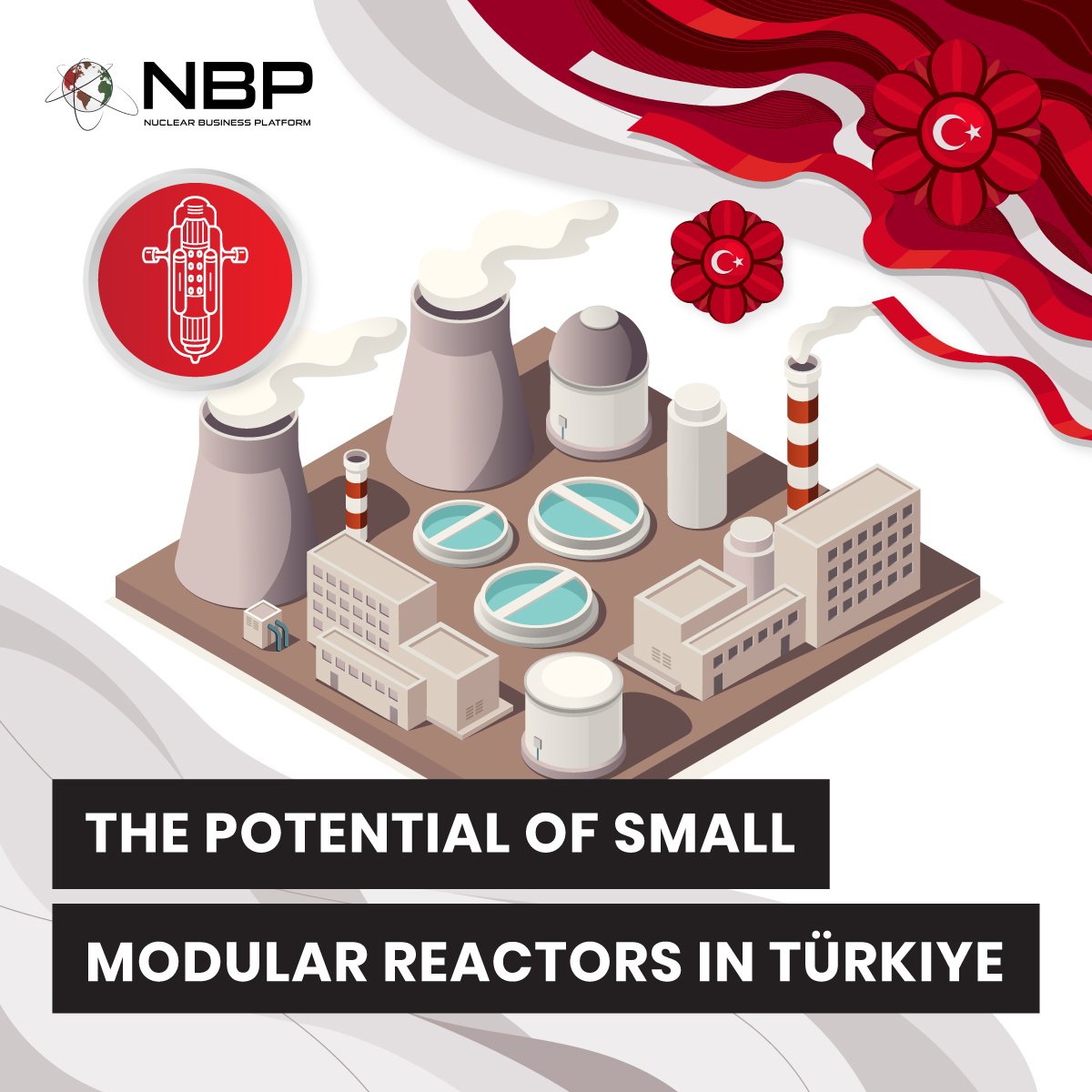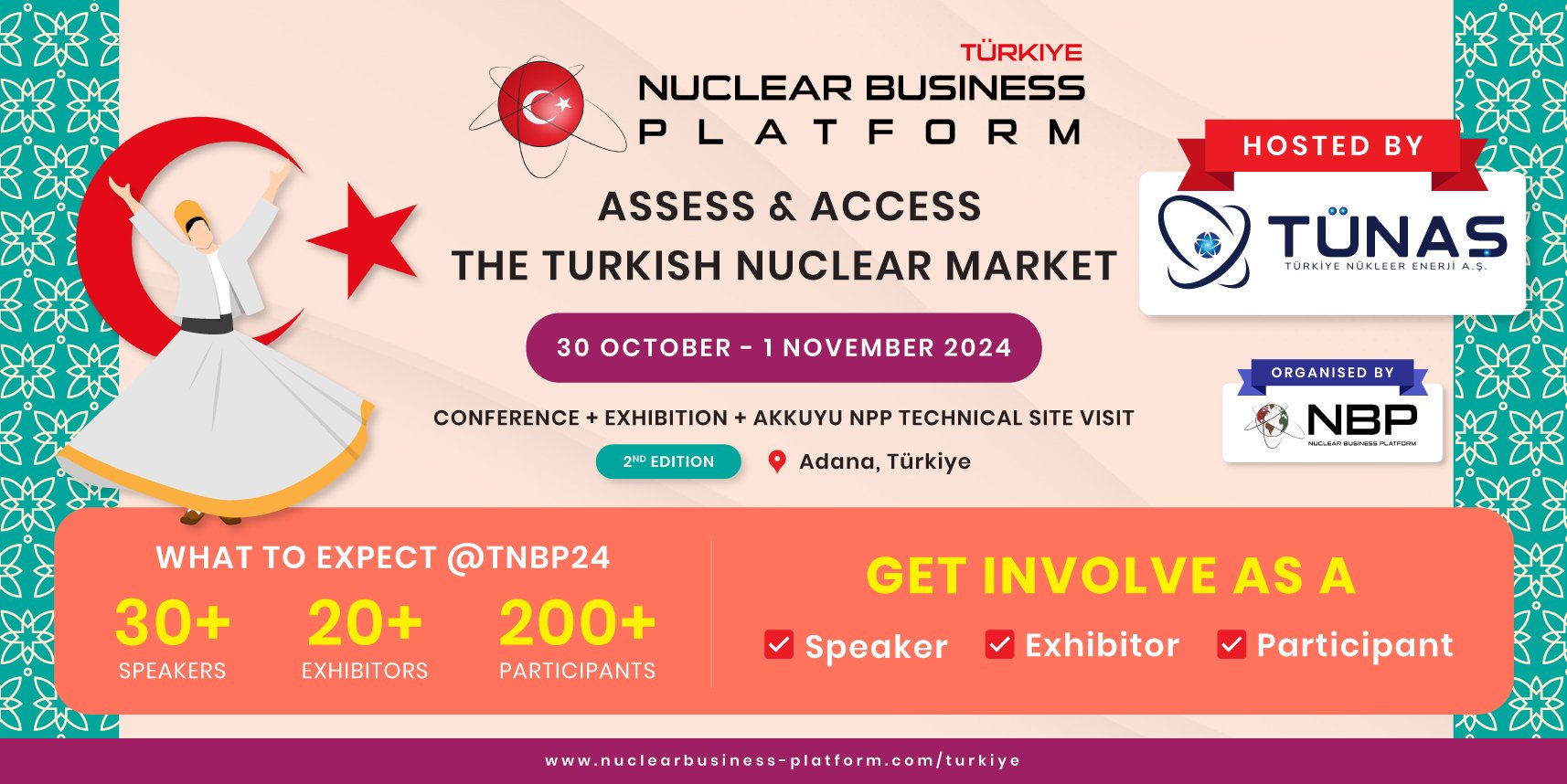The Potential of Small Modular Reactors in Türkiye
In accordance with the Turkish National Energy Plan, nuclear power generation is projected to account for 20,000 MW by 2050. The Turkish government aims to integrate both traditional nuclear power plants currently under construction and those planned into the country's energy portfolio. Additionally, there is a focus on the implementation of small modular reactors (SMRs). Consequently, it becomes imperative to analyze the prospective market for SMRs in Türkiye and monitor related developments closely.
What are SMRs?
Small Modular Reactors (SMRs) represent a category of compact nuclear fission reactors designed for factory construction, transportation to operational sites, and subsequent utilization to power various structures or commercial ventures. Each unit typically has a power capacity of up to 300 MW. The appeal of SMRs lies in their small-scale, modular design, offering a multitude of advantages for nuclear energy application.
The inherent benefits of SMRs stem from their compactness and modular nature. Their smaller size and streamlined construction processes translate into lower initial capital investments for nuclear facility owners. Furthermore, SMRs offer increased scalability, facilitating gradual expansion to meet evolving energy requirements. Their smaller footprint enables placement in locations unsuitable for larger nuclear facilities, enhancing flexibility in site selection.
Moreover, SMRs prioritize safety and security by employing passive systems and inherent safety features, such as low power and operating pressure. Additionally, the deployment of SMRs has the potential to stimulate economic growth by generating employment opportunities and fostering innovation in associated sectors. Overall, these advantages position SMRs as a promising solution for addressing energy demands while catalyzing economic development. SMRs, whether deployed individually or as multi-module facilities, also present the opportunity to integrate nuclear power with alternative energy sources like renewables.
TÜNAŞ Spearheading SMR Initiatives: Which SMR Design is Best for Türkiye?
Türkiye Nuclear Energy Company (TÜNAŞ), a state-owned entity, is the future owner and operator of new build NPP’s in Türkiye, which includes SMRs. Technical and commercial aspects of 11 SMR designs were evaluated by TÜNAŞ under 5 main and 18 sub criteria. The TÜNAŞ Reactor Technology Assessment Methodology was applied and an integrated SMR Designs Evaluation report was prepared. 25 experts from TÜNAŞ took part in this project spending a total of over 3300 hours preparing the reports. 118 bilateral comparisons were carried out and the project was completed in 6 months.
SMR Designs Evaluation Criteria: 5+18
Main Criteria #1 - Design
Reactor core and fuel
Cooling systems, safety features and defense-in-depth approach
Reactivity control and shutdown systems
Proven design
Coping time
Design status
Main Criteria #2 - Licensibility
Country of origin
Licensing status in countries
Maturity of safety analysis
Main Criteria #3 - Site Compatibility, Constructability and Operability
Need for cooling water
Seismic design
Constructability and modularity
Operability & operating experience (OPEX)
Compatibility for different usage areas
Main Criteria #4 - Development Program Maturity and Localization
Maturity of development program and applicability
Manufacturing, R&D needs and localization
Main Criteria #5 - Economic Assessment
Levelized cost of electricity (LCOE)
Investment cost
Reactor Technology Assessment Methodology
TÜNAŞ Reactor Technology Assessment Methodology provides:
A systematic, coherent and consistent assessment methodology of reactor technologies in an integrated manner,
A design-neutral systematic approach to evaluate the technical and economical merits of the reactor technologies already available on the market or expected to be commercialized in the near future.
The Methodology was developed in line with the IAEA approach.
Its main application areas are:
Technology assessment during feasibility studies,
NPP projects tender preparation process and evaluation of bids,
Evaluation of new designs as a decision-making tool and preparation for contract negotiations,
Evaluation of NPP technologies under construction or in operation.
International Initiatives
This month a Joint Statement on the U.S.-Türkiye Strategic Mechanism concluding the seventh meeting of the U.S.-Türkiye Strategic Mechanism presided by US Secretary of State Blinken and Turkish Foreign Minister Fidan stated that “Both sides acknowledged, particularly in light of net zero targets, the growing importance of civil nuclear energy, both conventional and Small Modular Reactors…and encouraged Turkish and US public and private sectors to explore opportunities and develop concrete proposals for cooperation in this field.” According to Justin Friedman, Senior Advisor for Nuclear Energy at the US State Department, there is a projected global increase in demand for SMRs. Friedman highlights the productive negotiations between Türkiye and the US regarding SMR technologies, noting significant interest from numerous US companies in the Turkish market. He emphasizes the positive contributions anticipated from the collaboration between Türkiye and the USA in the nuclear energy sector, asserting that ample opportunities lie ahead for both nations. Recently, the US Export-Import Bank (EXIM) unveiled financing options to support SMR development. Friedman mentions ongoing constructive discussions between the US and Türkiye concerning SMR technology, with efforts underway to develop a joint work plan.
Rolls-Royce SMR has an Memorandum of Understanding (MoU) already in place with Türkiye to evaluate the technical, economical and legal applicability of SMRs. In September 2023, a significant meeting took place between Rolls-Royce and the Minister of Energy and Natural Resources Alparslan Bayraktar who announced collaborative measures regarding SMRs as an integral part of Türkiye's energy strategies. Türkiye, along with Rolls-Royce and its consortium partners, has been involved in the development of the UK SMR, a small pressurized water reactor anticipated to have a lifespan of 60 years and a power output ranging between 400–450 MWe.
Türkiye applied for membership in the International Forum for Generation IV Reactors (GIF) in 2019. Notably, Türkiye stands as one of the nations endowed with significant thorium reserves.
SMR Demonstration Programs: A possible win-win scenario
An SMR demonstration project serves as a platform to showcase the capabilities and potential of SMRs, validating their design, safety, and efficiency in real-world scenarios. These initiatives mark significant milestones in the development and deployment of SMR technology, facilitating comprehensive implementation and verification processes that accelerate the enhancement of independent innovation capabilities within the SMR field. Furthermore, such projects play a pivotal role in advancing energy conservation and reducing emissions.
Considering the benefits of SMR demonstration programs, Türkiye could contemplate initiating one within its borders to gain valuable insights into the technology's future adoption. These efforts could bolster Türkiye's technological prowess in the nuclear sector and stimulate research and development endeavors. By participating in SMR demonstration programs, Türkiye could position itself as a leader in nuclear energy. Collaborating with SMR vendors could offer financial and technological advantages without bearing significant financial burdens, as the responsibility would lie with the SMR company. Additionally, this collaboration could involve training the local workforce, ensuring the availability of skilled personnel for the project. Moreover, Türkiye's strategic geographic location makes it a potential hub for exporting SMR technology to neighboring countries. Sharing knowledge and expertise from such partnerships and programs could streamline Türkiye's SMR plans and facilitate smoother implementation processes.
During the 1st Nuclear Energy Summit 2024 in Brussel on 21st March, the Turkish minister of foreign affairs stated “Akkuyu nuclear power plant is our Flagship project, once fully operational it will meet 10% of our electricity demand. Our objective is to raise this level by building additional conventional plants as well as small modular reactors”. Türkiye's venture into the nuclear sector signifies a strategic move aimed at diversifying its energy sources and reducing its reliance on fossil fuels. The Akkuyu nuclear power plant, a collaborative effort between Türkiye and Russia, is Türkiye's first nuclear facility. With a VVER-1200 reactor boasting a capacity of 4*1200MW, construction began in 2010, and the project is expected to operate for 60 years, extendable by an additional 20 years.
Aside from Akkuyu, Türkiye is in talks with Russia and South Korea for a second plant in Sinop, and negotiations with China are ongoing for a third plant in Thrace.
Türkiye's focus on SMRs underscores its commitment to advancing nuclear energy adoption as a strategic goal. By embracing SMR technology, Türkiye aims to enhance its energy production capacity, strengthen its economic resilience, and improve environmental sustainability. This approach aligns economic prosperity with environmental consciousness.
Prof. Dr. Uğur Çevik, Vice President of the Turkish Energy, Nuclear, and Mining Research Institute (TENMAK), highlighted the benefits of SMRs for Türkiye during the Türkiye Nuclear Business Platform 2023. He emphasized how SMRs align with social, environmental, and economic factors, offering a boost to Türkiye's energy capacity when integrated with existing reactor plans. Implementation of SMRs in Türkiye promises substantial advancements in the nation's energy landscape. Despite Türkiye's willingness to collaborate with global SMR vendors, these vendors have yet to fully capitalize on this opportunity.



